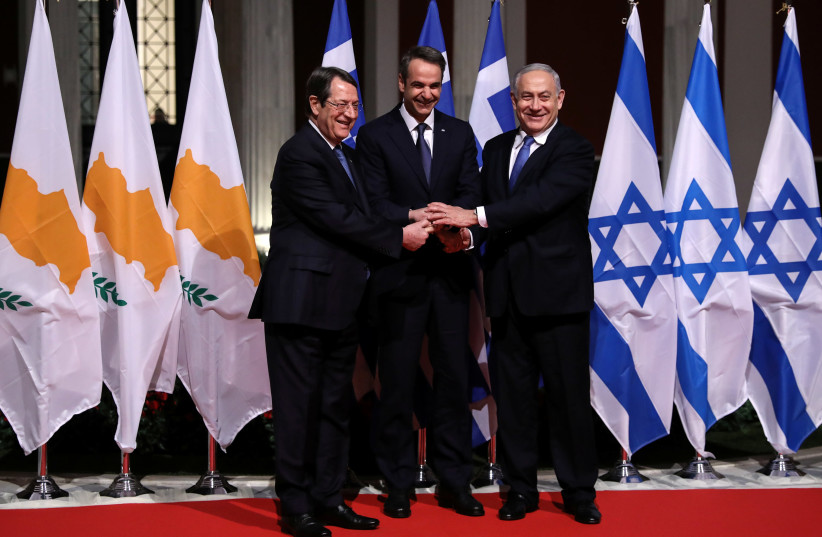Withdrawing US support for the EastMed Pipeline undercuts US allies and the European Union’s push for energy independence, US representatives Gus Bilirakis (R-Florida) and Nicole Malliotakis (R-New York) wrote to US Secretary of State Antony Blinken.
“The administration must realize the significant economic, environmental, and national security implications that are at stake in this matter and reconsider its decision to withdraw support for this critical project,” Bilirakis said this week.
The US Biden administration informed Israel, Greece and Cyprus in recent weeks that it no longer supports the proposed EastMed natural-gas pipeline from Israel to Europe, in a reversal of US position from that of the Trump administration. The project was announced in 2016, and several agreements on it have been signed between the three countries that aim to complete the €6 billion ($6.8b.) project by 2025, though no financing has been secured.
Europe is facing a surge in energy prices, the representatives pointed out, arguing that the continent will primarily rely on natural gas for energy for decades. They noted that the EU considers the EastMed pipeline a “special project.”
“The surge in energy prices has ironically led to the increased use of coal to meet demand,” they stated. “Since natural gas is a cleaner energy option over other fossil fuels, it is a crucial energy source for government policies seeking to transition into greener energies. The European Union recognizes this and has even declared the pipeline a special project. The EastMed pipeline project would not only alleviate future shortages of natural gas to Europe, but would promote energy independence and economic prosperity for our strategic allies of Greece, Israel and Cyprus.”

They also argued that the EastMed reversal has national security implications as Russia amasses troops on the border with Ukraine ahead of a possible invasion.
The change in policy is “hypocritical and offensive,” because of “the administration’s continued tacit approval of Russia’s Nord Stream 2 pipeline, deepening Europe’s energy dependence on an adversary... Biden’s announcement last May to suspend sanctions on the Russian pipeline and his continued fight against sanctions shows clear preference toward Russia over our allies.”
Russian President Vladimir Putin “is once again using Europe’s reliance on Russian gas to seek concessions from Europe... preparing to invade Ukraine in the middle of winter when energy demand is highest,” they argued.
Malliotakis said that US President Joe Biden “is asleep at the wheel, and his decision-making could cause severe economic and national security consequences for America and our allies.”
The US Embassy in Jerusalem said last week that the Americans “remain committed to the energy security and connectivity of the Eastern Mediterranean.”
Among the proposals the US supports is the EuroAsia interconnector linking Israeli, Cypriot and European electricity grids, “allowing for future exports of electricity produced by renewable energy sources, benefiting nations in the region.” The interconnector “would not only connect vital energy markets but also help prepare the region for the clean energy transition,” the embassy said.
The US Embassy also said this is “a time when Europe’s energy security is – more than ever – a question of national security,” and as such, the US is “committed to deepening our regional relationships and promoting clean energy technologies.”
The US Embassy in Greece made a similar statement last week, saying Washington still supports the 3+1 mechanism of meetings between Israel, Greece, Cyprus and the US.
Claims over natural gas in the Eastern Mediterranean have been a point of contention with Turkey in recent years, with Ankara saying it should be part of the EastMed project.
Turkish President Recep Tayyip Erdogan took the opportunity of the US withdrawing its support to say: “[If Israeli gas] would be brought to Europe, it could only be done through Turkey. Is there any hope for now? We can sit and talk about the conditions.”
Turkish state media channel TRT aired a documentary titled The Pipe Dream this month opposing the EastMed pipeline, which includes footage of State Department Senior Advisor for Energy Security Amos Hochstein discussing the matter before he was appointed to his current position.
Hochstein said he would be “extremely uncomfortable with the US supporting this project” because it would be investing in fossil fuels.
In addition, Hochstein argued the project was not financially feasible. It would cost more than €6b., he said, adding that international financial institutions no longer are committed to investing in fossil fuels.
The pipeline plan was “totally driven by politics,” but “multibillion-dollar deals should be driven by the commercial side,” he said.
